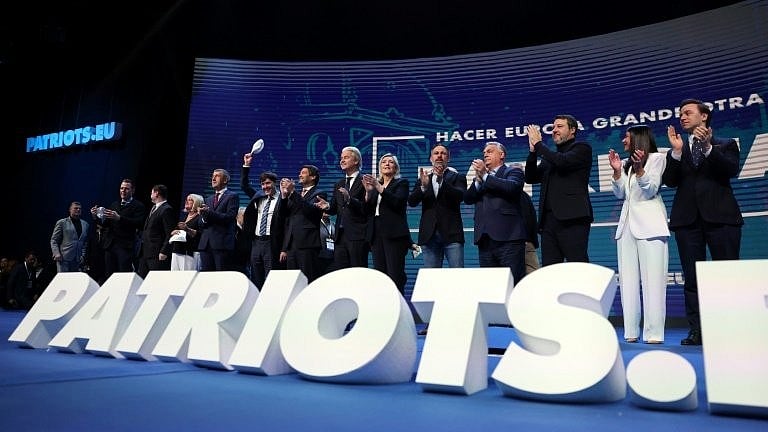The ‘Make Europe Great Again’ rally in Madrid on February 8, organised by several standard bearers of authoritarian and ultra-nationalist parties from the European Union (EU), is symbolic of the enormous momentum the far-right has gathered since the return of U.S. President Donald Trump to the White House. Speakers at the rally drew liberally upon President Trump’s ‘Make America Great Again’ anti-immigrant rhetoric. They were, in effect, portending the dangers from a potentially tectonic shift away from the lofty ideals of freedom, democracy, equality, respect for human dignity, and the rule of law that inspired the founding in 1957 of the EU’s visionary predecessor institution, the European Coal and Steel Community (ECSC).
‘Who do I call when I want to speak to Europe?’ goes an apocryphal joke attributed to then U.S. secretary of state Henry Kissinger in the 1970s. The stalwart statesman was poking fun at the very idea that the EU, a transnational group of countries across the Atlantic – represented by multiple institutions often speaking in conflicting voices – should entertain grandiose visions of establishing a bulwark against another Holocaust.
Kissinger’s rhetorical observations, made five decades ago, ring ominously true in the current volatile trajectory in transatlantic relations. The bloc of 27 states appears ever more rudderless, even as it confronts an unprecedented existential crisis in its nearly 70-year history. The Franco-German engine that has traditionally steered the EU locomotive has been sputtering since the former German chancellor Angela Merkel stepped down in 2021. Four of the bloc’s six founding member states are under the sway of populist and far-right parties that are sworn to a return to old-style nationalism.
France, the second biggest EU nation, has witnessed the rise and fall of two minority governments in the space of a few months. This is thanks largely to the awkward hung parliament that resulted from a snap election that President Emmanuel Macron, leader of the centrist Renaissance party, called in July. In consequence, the latter’s political authority has been much diminished at home and in Europe. There is the leader of the far-right Rassemblement National (RN), Jean-Marie Le Pen, who has long embraced U.S. President Donald Trump and his “alt-right” brand of politics. Le Pen once famously pledged to pull France out of the single currency zone and hold a referendum on the nation’s EU membership. As prosecutors in Brussels move to ban the firebrand leader from holding public office for five years in a criminal embezzlement case, her impatience to enter the Elysee Palace is understandable.
In Germany, voters are awaiting the results of Sunday’s general elections with bated breath, as the far-right, Eurosceptic, xenophobic, and anti-immigrant Alternative for Germany (AfD) party is forecast to garner the second highest number of seats in the Bundestag (parliament’s lower house). Should pollsters be proved right, cracks could appear in the so-called cordon sanitaire, the ring-fence to inoculate the country’s post-war governments from lurching to the political extreme. The centre-right Christian Democratic Union (CDU), its Bavarian sister party, the Christian Social Union (CSU), and the centre-left Social Democratic Party (SDP), whose vote share has been shrinking over the years, would be hard put to muster the requisite numbers to forge a viable coalition in Berlin.
In Italy, the EU’s third biggest economy, the right-wing coalition government is headed by Prime Minister Giorgia Meloni’s Brothers of Italy party, which has roots in the postwar neo-fascist movement built by Mussolini’s supporters. In the Netherlands, the right-wing extremist Freedom Party (PVV) topped the 2023 polls and secured 5 ministerial portfolios. The price extracted in return was the ejection of its leader, the firebrand anti-Islam campaigner Geert Wilders, from government. In Austria, there is a not dissimilar, if still unfolding, drama nearly six months after the general elections in September, where the ultra-nationalist and Eurosceptic Freedom Party (FPO) emerged the single largest party, albeit without a majority. Parties of the political centre have revived attempts to cobble together a workable coalition by isolating the FPO. The role model for these and other ultra-nationalists on the EU’s eastern flanks is the Hungarian autocrat of more than a decade, Viktor Orban. On the EU stage, the far-right captured a quarter of the vote share in the 2024 elections to the European parliament, thus earning access to EU funds and immense influence in policymaking. The one silver lining amid the expansion of the far right in the EU has been Poland’s re-election in 2023 of a centre-right government under the premiership of Donald Tusk, after the extreme right Law and Justice Party (PiS) was trounced.
The EU is clearly mired in an identity crisis, mostly of its own making. The path out of this morass must begin with an acknowledgement among mainstream parties of the extraordinary damage wrought by their proclivity to pander to populist sentiment, above all in the areas of immigration and global warming. That said, the bloc could draw hugely upon the collective sense of political resolve, unity and solidarity its leaders have displayed in the wake of recent crises. This stance was brought into sharp focus during the fractious negotiations to determine the terms of Britain’s withdrawal from the EU following the country’s stunning 2016 referendum vote to terminate its 47-year membership of the EU. Similarly, the bloc can ill afford to defer difficult decisions relating to its defence and security imperatives arising from the current turbulent turn of events across the region.
